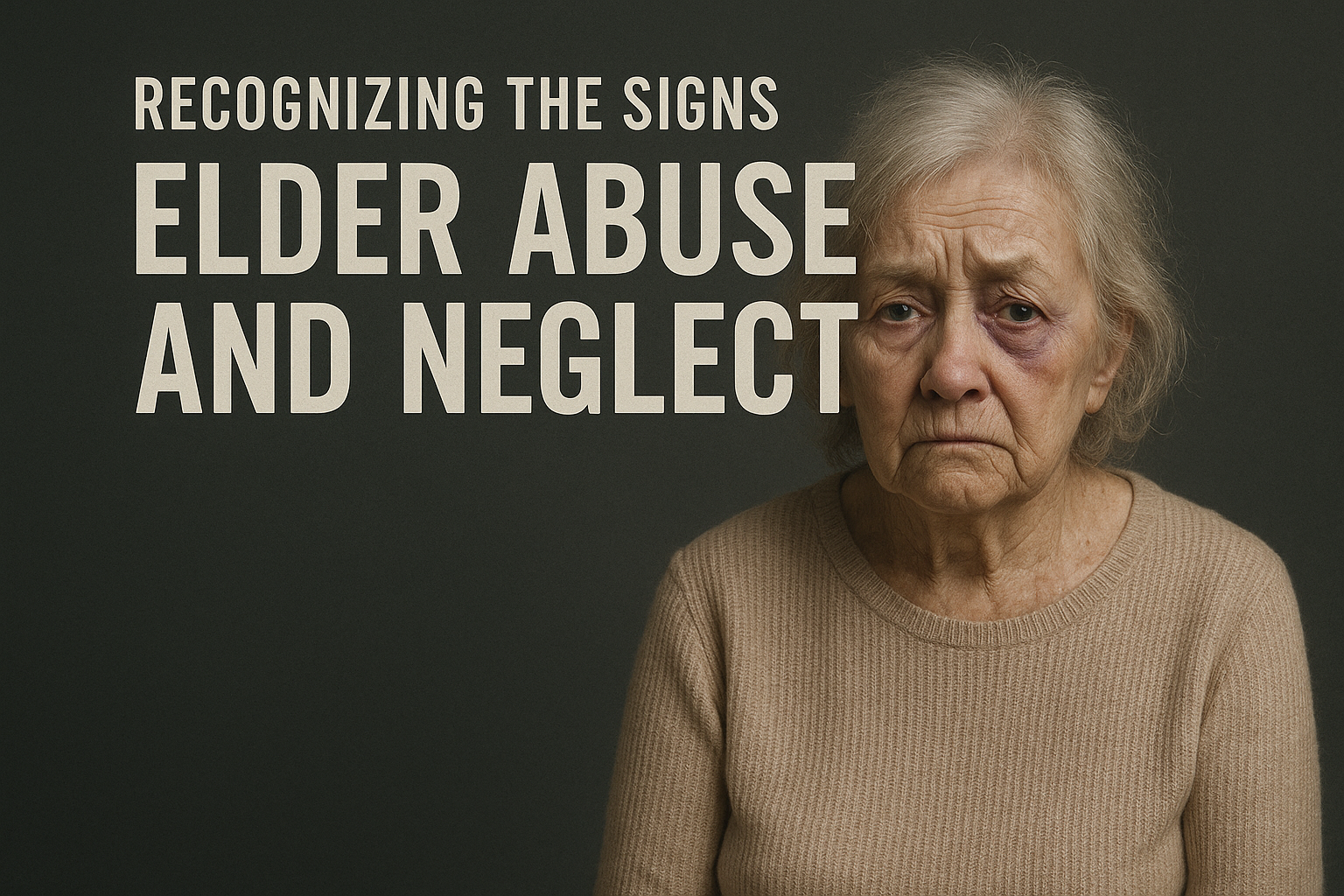Have you ever worried about an elderly loved one and wondered if something might be wrong?
Maybe they’ve been acting differently lately or seem sad, confused, or hurt. It’s hard to imagine, but elder abuse and neglect can happen anywhere-even in places meant to keep seniors safe.
In this blog post, you’ll learn how to spot the warning signs of elder abuse and neglect. Knowing what to look for can help you protect someone you care about and get them the help they need.
What Elder Abuse Means
Elder abuse is when someone hurts, mistreats, or fails to care for an older adult. This can happen in many ways. It may be physical harm, like hitting or pushing.
It could also be emotional, like yelling, threatening, or ignoring someone. Some seniors may even suffer from neglect, where their basic needs, like food, medicine, or hygiene, are not met. Others might be taken advantage of financially.
This kind of abuse doesn’t always leave bruises or marks. Sometimes, it’s hidden behind quiet behavior, fear, or sudden changes in mood or health. The sad truth is that most victims know the person who is hurting them.
Why Elder Abuse Happens
Understanding why elder abuse happens can help us stop it. Some caregivers may be overwhelmed, stressed, or untrained. Others may act out of anger or frustration.
In some cases, people may take advantage of seniors for their money or property. Seniors with memory problems, like dementia, are at even higher risk because they may not remember what happened or be able to speak clearly about it.
When older adults don’t have many visitors or people checking in on them, it becomes easier for abuse or neglect to go unnoticed. That’s why staying involved in your loved one’s life is so important.
Physical Clues You Should Not Ignore
Sometimes the signs are clear, but other times, they are not so obvious. If an older adult has cuts, bruises, or burns with no clear explanation, that could be a sign of abuse. If they suddenly seem scared of a caregiver or jumpy around certain people, that could also be a clue.
Other things to watch for include broken bones, repeated falls, or signs that someone is not getting the help they need. A loved one might lose weight, become very tired, or look dirty and uncared for. These may also be signs of nursing home neglect.
Emotional Changes Can Be a Cry for Help
Physical harm is not the only kind of abuse. Emotional abuse can be just as serious. If your loved one seems sad, nervous, or withdrawn, this may be a red flag. They may start acting differently-becoming angry, scared, or even confused.
If someone who used to enjoy company now avoids others, that change might mean something is wrong. It’s also important to pay attention if they seem scared of a specific person or place. They may not say what’s happening, but their actions can speak lou
Money Problems Could Be a Warning Sign
Financial abuse is another common form of elder mistreatment. This can happen when someone steals money, tricks an older adult into signing papers, or pressures them to give away property.
If you notice that bills are not being paid or money is missing, it’s time to ask questions. Be alert if valuable items disappear or if your loved one seems confused about their finances. They might not realize they are being taken advantage of, or they may feel too embarrassed to say anything.
Watch for Signs in Care Facilities Too
Even in places that are supposed to be safe, like nursing homes, elder abuse can happen. Staff members may be too busy, tired, or poorly trained to give proper care. In some cases, they may even harm residents.
If you visit a care home and find that your loved one looks unwashed, is left alone for long periods, or seems afraid of the staff, you should take those signs seriously. Talk to the home’s manager or social worker right away if you feel something isn’t right.
How You Can Help Right Away
If you think someone you love is being abused or neglected, don’t wait. Speak up. Ask your loved one how they feel and if they feel safe. If they are unable to talk or too afraid to speak, look for the signs and trust your gut.
You can also talk to a doctor, social worker, or local adult protection service. In emergencies, always call 911. Reporting the problem can protect your loved one and help others, too.
You don’t have to fix everything by yourself. Many places offer support and advice to families going through this. Just knowing where to turn can be a big step toward making things better.
Talking About It Makes a Difference
One of the hardest parts of elder abuse is that people don’t want to believe it could happen. But by learning about it and being willing to talk, you’re already doing something important.
Start conversations with other family members. Share what you know. The more people who understand how to recognize abuse, the better chance we have of stopping it before it causes more harm.
Check in often with your loved ones. Ask them how they’re doing. Listen closely. Even small talks can show that someone cares-and that makes a big difference.
Time, Patience, and Love Matter
Helping someone who has been abused takes time. It’s not just about stopping the bad behavior-it’s about helping them feel safe again. Be patient and kind. Let them know they’re not alone.
Try to create a safe, loving space where your loved one feels respected. If they need new care or a different living situation, help them find it. They may feel scared or unsure, but your support will help them heal.
Remember, small steps can lead to big changes. You don’t have to do everything at once. Just being there matters more than you know.
You Can Be the Voice They Need
Recognizing the signs of elder abuse and neglect is key to protecting seniors from harm, ensuring early intervention, safety, and compassionate care. Every person deserves to feel safe, respected, and cared for-especially in their later years. Abuse should never be part of anyone’s life, and with your help, it doesn’t have to be.
By learning the signs, watching closely, and speaking up, you can help stop abuse and bring comfort to those who need it most. Did this guide help you? Browse the rest of this section for more advice on a variety of topics.












